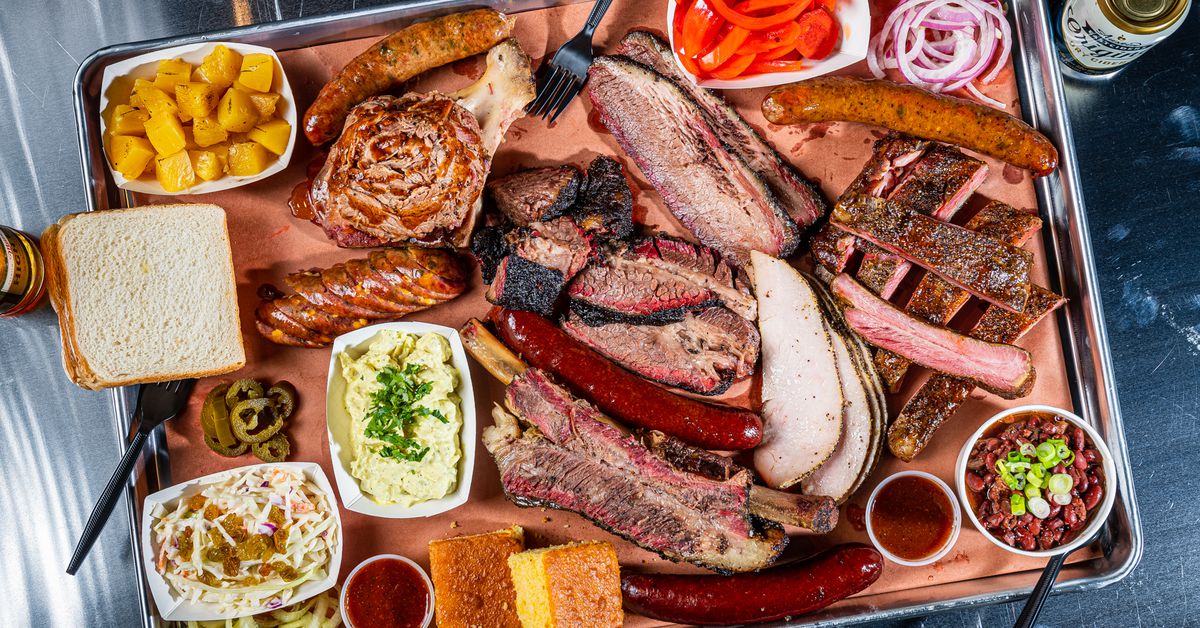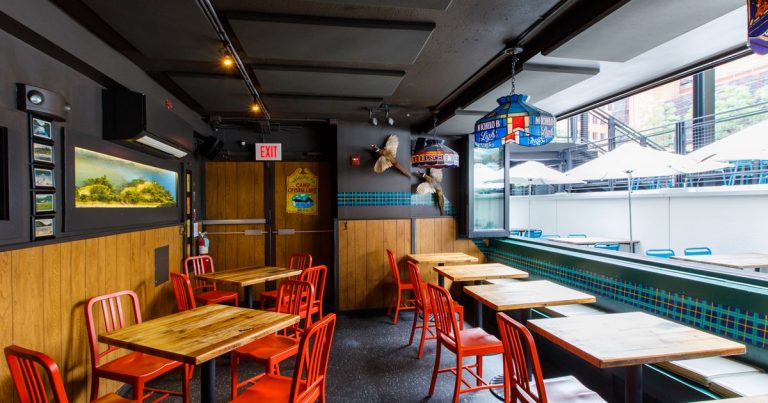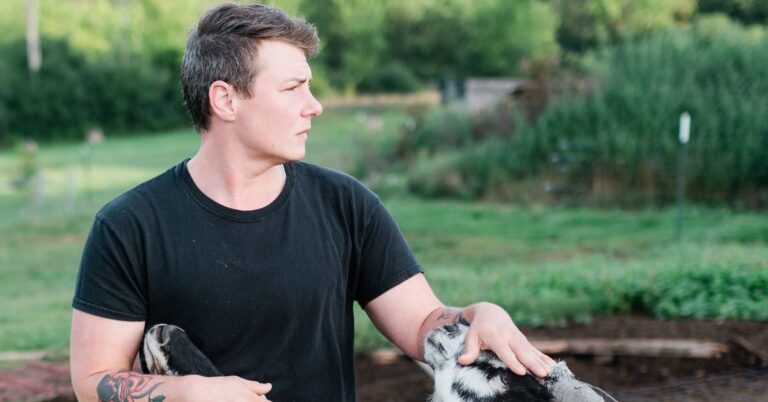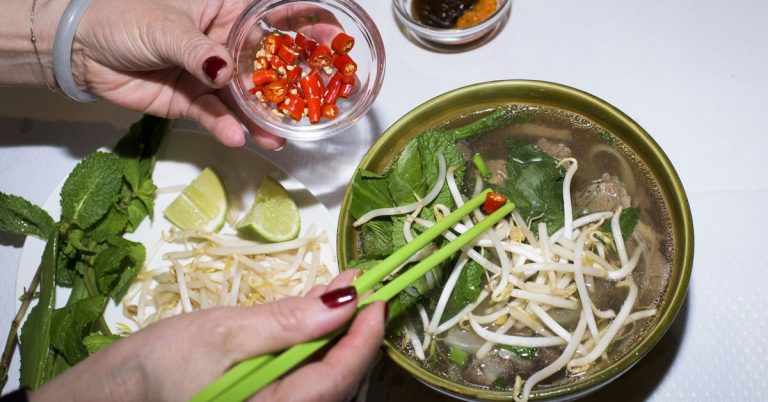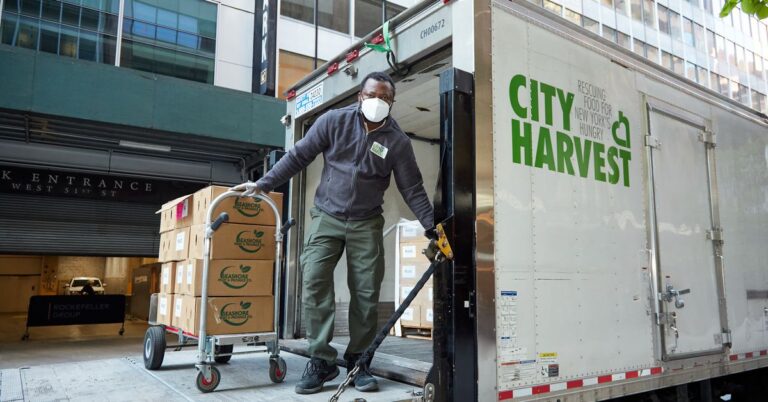DC Restaurant 2Fifty Texas BBQ’s Incredible Success Story Is More Complicated Than it Seems
When the first smoker arrived at 2Fifty Texas BBQ, people passing by started calling it “the spaceship.” Wrapped up in white plastic, the tubular metal body, pair of trailer wheels, and tall firebox sticking out like a tail fin formed the rough shape of a miniature NASA shuttle. The couple that commissioned the custom rig aren’t astronauts, but the story of how they brought some of the most extraordinary Hill Country-style brisket in America to the small Maryland town of Riverdale Park still represents an astounding journey.
It wouldn’t have been possible without the ingenuity of a Peruvian lawyer, the resourcefulness of the local Latin American business community, or the relentless drive of the couple behind the business, a pair of Salvadoran nationals who managed to establish U.S. residency using an unconventional strategy under an anti-immigrant Trump administration — and successfully open a restaurant amid a pandemic.
On the strength of masterfully smoked briskets boasting top-tier grades from the USDA, perfectly seasoned pork ribs, and tender turkey, 2Fifty Texas BBQ has become more than a hit restaurant. With their success, CEO Debby Portillo and pitmaster Fernando González have shown they are more than worth their weight in pulled pork to their new community — and, crucially, U.S. Citizens and Immigration Services.
“Barbecue saved our lives,” González says. “We owe everything to barbecue.”
:no_upscale()/cdn.vox-cdn.com/uploads/chorus_asset/file/23070339/untitled_6669.jpg)
Four years ago, when living outside the capital of San Salvador, González had become so obsessed with Texas barbecue that he asked a friend to weld together a barbecue pit for him. He built tropical fires, experimenting with logs from tropical fruit trees like mango and sapote while smoking briskets he sold to employees of the U.S. Embassy who found out about the barbecue on Instagram.
Today, thanks largely in part to the logistical prowess of Portillo — a third-generation restaurateur, 2Fifty’s administrative mastermind, and González’s wife — their stateside operation is so successful they keep adding smokers.
:no_upscale()/cdn.vox-cdn.com/uploads/chorus_asset/file/23070344/image0__15_.jpeg)
The “spaceship” came first. Built by Meadow Creek BBQ in Pennsylvania Amish country, its 500-gallon chamber was big enough to get 2Fifty off the ground. A little over a year after 2Fifty Texas BBQ opened with no dining room furniture except a fold-out table where customers could grab their takeout, González and Portillo added a 1,000-gallon rig from Georgia-based manufacturer Primitive Pits that cost them $25,000.
Educated as a civil engineer in El Salvador, González is an exhaustive researcher with a habit of falling deep down the rabbit holes of his cooking projects. Once he got hooked on Texas barbecue, he made pilgrimages to institutions like Snow’s in Lexington, Louie Mueller’s in Taylor, and Franklin Barbecue in Austin. He became fixated on the idea of barbecue as a craft, adopting the mantra of “no shortcuts” and making the decision to develop his style without the aid of electricity or gas. The business is named after the optimal Fahrenheit temperature inside his smokers.
By modeling himself after Hill Country legends, González was adopting a mode of barbecue that relies on salt, pepper, smoke, and little else. Cooking times are long, requiring constant supervision, and subject to the whims of the elements. Even meat that’s been prepared according to plan can dry out if it’s not stored the right way. The unforgiving nature of the cuisine appealed to his perfectionist tendencies.
“The learning curve for perfect barbecue, it’s infinite,” he says.
:no_upscale()/cdn.vox-cdn.com/uploads/chorus_asset/file/23070364/untitled_6376.jpg)
:no_upscale()/cdn.vox-cdn.com/uploads/chorus_asset/file/23070366/untitled_6564.jpg)
Because he set out to make Texas barbecue, González had to master brisket, a tough cut to crack. Because he set his goal to perfect the form, he had to have the best meat he could find. So even during the pandemic, when suppliers were already getting on his nerves by telling him all their other clients bought USDA choice beef instead of fattier, pricier prime, he and Portillo connected with two luxury purveyors known for sustainable farming practices: the Creekstone Farms collective, based out of Kansas, and Snake River, an Idaho outfit known for its breed of American wagyu.
Every movement a cook makes at 2Fifty follows a blueprint González has developed through his own studies, trial, and error. González has a five-part test that helps him decide when a piece of meat is done. When he trims a brisket, for example, he evenly distributes pours of a salt-and-pepper mixture by framing stretches of surface area with the top half of a gloved hand. His pit crews work in a gravel lot underneath a corrugated metal roof that protects pallets of Maryland white oak from getting soggy. He hates to leave the staff unattended for the late-night shift, even though he convinced his brother Moises González to move to Maryland for a job on the team.
Central Texas barbecue is the foundation of 2Fifty’s menu, but González isn’t confined to it. The pitmaster enthusiastically follows the zeitgeist of the barbecue world, which is why 2Fifty began serving beef ribs injected with pastrami brine and covered in a dark bark crusted with coriander seeds. González is always experimenting with specials, one day toying with strips of skirt steak braided in an Argentine gaucho style and grilled atop the firebox of the spaceship with a squirt of rendered beef fat, “Texas gold” in the pitmaster’s shorthand.
Portillo is adamant that 2Fifty won’t kowtow to customer requests for sweet baked beans. Her shop serves red beans simmered with brisket trimmings, pretty much the way her mother taught her to make them. Coleslaw contains raisins. There’s a side of pineapple baked with cinnamon and honey, then finished with a blowtorch.
One of 2Fifty’s newest creations is the ultimate Texas-Salvadoran mash-up: barbecue pupusas made with two types of corn flour, a blend of three cheeses, and smoked trimmings from brisket or pork. Selling pupusas was always part of the plan for the family behind 2Fifty. They just didn’t think they’d be doing it inside a Texas-style smokehouse.
In El Salvador, Portillo’s name is a big deal. Her grandmother, Margoth Portillo, turned a tiny pupuseria she founded in 1962 into Típicos Margoth, a brand name for traditional Salvadoran food recognized all around the country. By the time Portillo was growing up, her grandmother had broken up parts of the business to be assigned among her five children. Portillo’s father, Samuel, would inherit the farm and dairy that supplied all of the company’s restaurants.
From a young age, Debby Portillo displayed traits similar to her famous grandmother. Even though Doña Margoth only had a second-grade education, Portillo says her grandmother never struggled to give change, coming up with her own tricks for subtraction and multiplication. “I’ve always defined myself as a numbers person,” Portillo says, and she never doubted where she got that gene.
Portillo would assume the role of chief financial officer for her father’s company and its 13 subsidiaries. Down the line, in Maryland, this job would be the key to establishing residency through a special visa for multinational executives that’s more frequently granted for global conglomerates.
While González’s head is in the clouds, Portillo is the organized one in the couple, gaming out plans he cooks up out loud on a dry-erase board.
“One of the things that we need to do is to figure out how much to cook for [the product] to be great every day,” Portillo says. “I love it. That’s me at my best, figuring out that part. I love to see the numbers, the statistics, how much we sold the first Saturday of the month versus the last Saturday of the month.”
:no_upscale()/cdn.vox-cdn.com/uploads/chorus_asset/file/23070373/untitled_6612.jpg)
:no_upscale()/cdn.vox-cdn.com/uploads/chorus_asset/file/23070374/untitled_6580.jpg)
Besides a faculty for math, Portillo also inherited an entrepreneurial streak from her grandmother. She and her husband have had all sorts of businesses. Shortly after they were married, they moved to San Pedro, Belize, to sell jewelry. That was where they encountered their first barbecue stand; González was mesmerized by how people were drawn to the fire.
For one of the businesses González and Portillo started in El Salvador, the couple acted as couriers delivering encomiendas — parcels containing items as small-scale as makeup, watches, cheese, and tamales — to recipients in the States. Drop-offs in Dallas and Houston gave González an opportunity to sample his first Texas barbecue.
He returned determined to start smoking and selling his own.
He and Portillo launched a catering business, naming it dos6cinco (265), because González says he’d cook at slightly higher temperatures in the tropical latitude. Portillo’s brother, Samuel, an eventual partner in their new corporation, created an Instagram account for the brand. People who worked at the U.S. Embassy found out, and demand exploded.
As dos6cinco took off, González and Portillo saw an opportunity. They had learned the ropes of the restaurant business through their work at Típicos Margoth. But barbecue represented a new beginning for the family business and, eventually, a way out of El Salvador.
Born in 1986, González maintains vivid memories of the country’s 12-year civil war between leftist guerillas from the Farabundo Martí National Liberation Front and the corrupt, criminal Salvadoran government propped up by the anti-communist U.S. government. The pitmaster grew up in the neighborhood near José Simeón Cañas Central American University, where soldiers massacred six Jesuit priests — scholars who vocally opposed the government — as well as their cook and her 16-year-old daughter.
González remembers how the conflict sounded: booming explosions and the ominous whir of helicopter blades. His family would prop a mattress against the window as a buffer for stray bullets. In the aftermath of the war, the country’s class disparity widened. Financial inequity, the militarization of society, and an influx of deportees from U.S. prisons all fostered a rise to power for two gangs, Mara Salvatrucha and 18th Street, which had the country in a chokehold.
For the owners of 2Fifty Texas BBQ, a move to the U.S. represents an ambitious swing for their family of entrepreneurs. But the couple’s parental instincts played a big part in their decision to leave. They were afraid their daughter wouldn’t escape the gangs. Once it was time for her to start school, González says, the debate between public and private education included discussions of potential kidnapping or a forced marriage in a violent country with a high rate of femicide.
González was also convinced there was an element of destiny at hand. Portillo’s grandmother had set up the ensuing generations of her family to expand her restaurant empire. In his eyes, “it was in Debby’s veins to do her own thing.”
The decision to plant a business in Prince George’s County, Maryland, resulted from market research that pitted the D.C. suburbs against cities in California and Texas and on Long Island.
While growing González’s barbecue operation was always part of the plan, 2Fifty was intended to take a backseat to a Salvadoran food business, which helps explain why Maryland was so attractive. The greater D.C. area is home to more than 200,000 foreign-born Salvadorans, representing the largest Hispanic community in the region. According to 2019 U.S. Census data, Prince George’s County is 19.5 percent Latino or Hispanic, including more than 42,000 Salvadoran. In Riverdale Park, 56.3 percent of the 7,200 residents estimated in 2019 were Latino or Hispanic.
Portillo says her family’s foray into Maryland, where D.C. was close but rents were cheaper than in the big cities, was “the first time that I felt this is somewhere I could be.”
While still sleepy, Riverdale Park had advantages beyond its large Hispanic community. It’s on Route 1 — an artery for D.C. workers to homes in the Maryland suburbs like Mount Rainier, Brentwood, and Hyattsville — and East-West Highway, connecting the area around the University of Maryland to towns like Silver Spring and Bethesda.
Riverdale has been changing, too, welcoming the county’s first Whole Foods in 2017. The grocery store is the centerpiece of a $250 million development that includes townhouses and retail space that’s attracted a craft brewery and the site of a future food hall.
:no_upscale()/cdn.vox-cdn.com/uploads/chorus_asset/file/23070382/untitled_6367__1_.jpg)
In September 2018, the González-Portillo family arrived in Maryland with four bags, a plan to open a restaurant, and not much else. They had no family in the area, but in Prince George’s County, they found a support system that would set them up with all they needed.
They reached out to Rocio Terminio-Lopez for help setting up their business because a few years earlier, she had become the first Latina mayor elected in the history of Maryland. Terminio-Lopez holds that position in Brentwood, a town of fewer than 4,000 people located along the Route 1 corridor that connects D.C. to suburbs like Hyattsville and the University of Maryland in College Park.
Terminio-Lopez’s day job made her the perfect contact for the couple; as the Latino liaison for the Prince George’s County Economic Development Corporation, it’s her business to help people like González and Portillo sort through permits and slice through legislative red tape.
The liaison linked the couple with Jose Campos, the president of the D.C. metro chapter of the Salvadoran American Chamber of Commerce, who got them set up with an accountant, Roberto Lopez, who led them to Silvie Gallardo, the immigration attorney who would find a novel solution to securing their stay while they set up the business.
“It’s like a network,” Terminio-Lopez says. “You connect with one, and that one will connect you with the other one. That’s how we end up helping them.”
They wouldn’t have made it this far without Gallardo, who runs her one-woman legal practice without the help of a secretary and filled in her own naturalization paperwork as a law school student after coming over from Peru.
These days, Gallardo’s clients find her mostly through word-of-mouth, but she was recently surprised to find her name on a community list of resources posted to WhatsApp. The lawyer likes to assign documents for her clients to read as homework, but she also has an infectious laugh and frequently communicates with GIFs; the first time she tried 2Fifty’s barbecue, she sent Portillo and González one of a hamster scarfing down a pile of hot dogs.
Gallardo does not practice in court. Her primary adversaries, as she sees it, are the contractors working in the mail room at U.S. Citizens and Immigration Services who are looking to disqualify paperwork she submits based on the minutiae of how she fills out forms.
In the early days of the 2Fifty family’s U.S. residency, they held B-1 visas classifying them as temporary business visitors. That granted them a maximum stay of six months and the opportunity to apply for another six-month extension. It also meant that while they could set up meetings and negotiate contracts, they would be prohibited from performing any work until they obtained a different visa.
Once Gallardo dug into the immigration case for González, she devised a plan that surprised her. Because Portillo’s family was already seeking to expand from the corporation they held in El Salvador, she fit the profile of an applicant for L-1A status designating her as a corporate executive undergoing an international transfer and establishing a new corporate office. This new holding company would be called Madre USA.
Gallardo had never applied for a visa in the L category for a business that small; the application would usually be filed on behalf of a company with branches on several continents. She explained to the couple that this was not a typical case for her, and she would have been happy to suggest larger firms. They wanted to stick with her.
“I think they felt comfortable that I was going to fight for them like a dog with a bone,” Gallardo says. “They mattered. They weren’t a number to me.”
Gallardo discussed the strategy with other immigration attorneys in her network, laying out the case online to a Latin American chapter of a women’s immigration group. They were supportive. It shouldn’t matter if the company is small, they said. If Portillo met all the criteria, she should be granted temporary residency. Petitioning for L-1A status would grant Portillo and her family a year to show the federal government they had established a stateside branch of the corporation from back home.
“I cannot dress up the owner of a hot dog cart as an executive,” Gallardo says. “That’s not what you do.”
The new company had to meet a number of criteria to define Portillo as an executive establishing a new office, including setting up a physical space. The Prince George’s County Economic Development Corporation stepped up to provide one through its Innovation Station Business Incubator program.
Portillo had to prove she’d worked as an executive or manager for at least a full consecutive year within the three years preceding the petition. The parent company had to prove that its new office would support a manager within a year of filing the petition. Once the U.S. accepts the petition, the company has one year to show the federal government it has met all the criteria of establishing a new office. After a year of working to establish a new office, the company and the individual can apply for a renewal that grants two more years of residency to its U.S. executive.
“If you have created jobs for the American people, you can stay,” Portillo explains. “If you take jobs away, you have to go.”
“No pressure,” González says.
To keep growing, the couple had to find an actual restaurant space. Terminio-Lopez, the county Latino liaison, hoped to find a space for 2Fifty Texas BBQ in Brentwood, where she serves as the mayor, but there weren’t many properties that fit the bill. She remembers driving the owners up Route 1 into Riverdale Park, where they became enamored with an old building near the center of town that held a pizza shop on one side and an abandoned corner store on the other.
“Something about that corner grabbed their attention,” Terminio-Lopez says.
The space that would become 2Fifty Texas BBQ had been vacant for years and was in a state of disrepair. But the restaurant group saw potential. There was a basement level for storage. Original tin ceilings lent character. A Dumm’s Corner sign out front held recognition in the community.
The company started to negotiate a lease with the owner, Pete Spiropoulos, who had come to D.C. from a little village in Greece near the town of Delphi long before buying the property in the ’80s. In order to settle the landlord’s concerns about putting his daughter out of business, the owners of 2Fifty bought Georgia Spiropoulos out of Dumm’s Pizza but otherwise kept the established business the same. The neighborhood spot for pizza and subs kept cash flowing in, buying the company some time to figure out how to open a place for González’s barbecue.
Before they turned Dumm’s Corner Market into 2Fifty Texas Barbecue, González and Portillo found other ways to get their name out in the community. One early break was making a connection with Jim Coleman, the manager of the Riverdale Park Farmers Market.
Coleman said 2Fifty was an “immediate hit” with customers, and the fact that the owners were bilingual made them an even bigger draw. Like many who tasted González’s barbecue, Coleman developed a deep appreciation for 2Fifty’s brisket. He sounds like a food critic as he describes how the cooks use just the right amount of smoke, or the “piquancy” of the salt-and-pepper rub.
“It just is a beautiful thing to turn a basic piece of meat into this art form,” Coleman says.
With the farmer’s market stand, 2Fifty grew a customer base that would eventually follow them to the storefront. Catering gigs, the farmers market stand, and the pizza business they took over at Dumm’s Corner were bringing in money, but González and Portillo were still burning through cash.
The shell that would become 2Fifty Texas Barbecue needed a lot of work. They made what repairs they could, preserving the original tin ceiling and hosting “Barbecue Sunday” pop-ups at the pizza shop while they waited on permits. The coronavirus crisis made nearly every aspect of running a restaurant more difficult, but it helped Portillo and González in one big way. With restaurants closed for dine-in service early in the spring of 2020, the owners could open the restaurant for carryout before they could afford tables or chairs.
One early fan of González’s barbecue was Alan K. Thompson, the mayor of Riverdale Park. In another bit of kismet, the head official of the town grew up in Austin, Texas, so endorsement of the Hill Country-style meats carried added weight. “It has not been good for my waistline to have them three blocks away from my house,” Thompson says, “but it’s been very good for my soul.”
:no_upscale()/cdn.vox-cdn.com/uploads/chorus_asset/file/23070386/untitled_6538.jpg)
In April 2020, 2Fifty Texas BBQ announced its official opening for takeout. Within seven months, Washington Post food writer Tim Carman would award the new venture the No. 1 spot on his comprehensive local barbecue rankings. The mayor started scheduling his weekly visits late in the day to give visitors a better shot at sampling the brisket before it sold out.
Suddenly, Riverdale Park had a destination restaurant. “It puts us on the map as an interesting place to be,” Thompson says. “They have added so much to the community just by being completely engaged and so part of it and wanting to be part of it from the first day.”
While 2Fifty’s barbecue profile grew, Portillo and González kept building. One of the most important pieces was a custom wooden chopping block that González oils every night. Then came a saddle and a neon sign spelling out their name. By the doorway, the couple installed shelves lined with cookbooks and caps that pay homage to their favorite barbecue spots, places like Lewis Barbecue in Charleston, South Carolina.
In January 2021, days before Portillo’s L-1A work visa was set to expire, the couple received the news from their immigration attorney that they were desperate to hear.
The government had approved a two-year extension they had applied for the previous June, validating all the work the couple had put into building the business since they’d arrived. That sets the precedent for more extensions that cap out at a total of seven years, after which the next logical step is applying for permanent residency.
Portillo says “it was an incredible triumph” to secure the extension, especially considering the federal government’s hostile immigration reform during Donald Trump’s four years in office.
Trump famously generalized Mexican migrants as rapists, drug dealers, and criminals in the speech that launched his campaign for president. One of his first actions in office was an executive order banning travelers from seven predominantly Muslim countries. He attempted to rescind the Obama-era Deferred Action for Childhood Arrivals program that protected young undocumented immigrants from deportation, and enacted a “zero-tolerance” policy that led to migrant children being separated from their parents at the Southern border.
Those were the most visible actions, but the Trump administration made many more small alterations to immigration policy that collectively created huge obstacles to people attempting to obtain legal residency in the U.S.
The Migration Policy Institute in D.C. counted more than 400 rule changes in immigration policy that officials put into place under Trump, including a move in 2018 for United States Citizenship and Immigration Services to reject any forms that contain blank spaces.
USCIS slashed spending and emphasized fraud detection in visa applications, leading to increased wait times for applicants. An analysis of the USCIS backlog from the American Immigration Lawyers Association found “crisis-level delays” in processing applications, petitions, and other requests.
From fiscal years 2017 to 2019, the processing time for Form I-765 (Application for Employment Authorization) grew 45 percent, to four and a half months. Last September, a federal judge in San Diego blocked the government from imposing major fee increases for citizenship and other immigration benefits.
Gallardo, the immigration lawyer for the owners of 2Fifty Texas BBQ, said navigating all the changes for her clients was not only frustrating, but “absolutely heartbreaking.” Applications have become “very, very uncertain,” she says. “You didn’t know if even doing your best job, or even doing best-plus, was going to get approved. Even if you had a deserving client.”
For Gallardo, Portillo and her family are the dream clients. The lawyer describes the ownership of 2Fifty Texas BBQ as “methodical.” If it didn’t make business sense to be in Maryland, they would have never arrived. And the more 2Fifty’s business grows, the owners’ standing in the eyes of the government can only get stronger.
“They’re such nice people, but they don’t get immigration benefits because they’re nice people,” Gallardo says. “They get immigration benefits because their business is solid.”
The response to 2Fifty’s barbecue has proven that.
To meet demand, the company commissioned its first 1,000-gallon direct-flow smoker from Primitive Pits. This spring, a little less than a year after opening the Riverdale Park smokehouse for takeout, 2Fifty announced it was expanding into D.C. with a stall inside Union Market, the city’s most prominent food hall.
On opening day, in June, Portillo worked the register while González and another staffer sliced barbecue, plated sandwiches, and assembled Texas Trinity combination trays that featured brisket, pork ribs, and jalapeno cheddar sausage.
In between greeting customers and slapping brown butcher paper down onto trays, González paused to reflect on the young company’s growth. 2Fifty had grown to 27 employees. As of November 2021, it was 34, the majority of which make at least $20 an hour. “We never stopped hiring,” he said.
The decision to use prime briskets and the monastic devotion to learning Texas-style techniques were important to him, but as he looked back, González said neither of those were the main ingredient in 2Fifty’s proverbial secret sauce. It was the people, first and foremost the employees, that González wanted to credit. The swift rise wouldn’t have been possible without their Maryland neighbors, their landlord, the members of the Hispanic community who helped them navigate policy, and the immigration attorney still working to obtain a long-term legal residency.
Asked how his new smoker was performing, González gave a positive report that elicited a knowing look from the CEO who happens to be his wife. “He already wants another one,” Portillo said at the time. A few months later, they submitted an order for another 1,000-gallon barrel.
In the gravel lot attached to the restaurant in Riverdale Park, there’s only enough room to park two wood-burning smokers. Earlier in the fall, the couple listed “the spaceship” for sale.
González acknowledges barbecue’s potential to humble anyone who thinks they’ve got it figured out. But he also thinks there’s no ceiling to how far it could take his family. As long as he dedicates himself to the craft, he really can’t make too much meat.
“I think if your barbecue is good enough,” he says, “It’s never going to be enough.”
:no_upscale()/cdn.vox-cdn.com/uploads/chorus_asset/file/23070390/untitled_6522.jpg)
